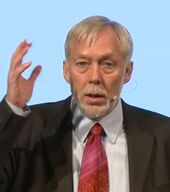Roy Baumeister
| Name: | Roy F. Baumeister |
| Date of Birth: | May 16, 1953 |
| Occupation: | Professor of Psychology |
| Ethnicity: | Unknown |
Roy F. Baumeister (/ˈbaʊmaɪstər/; born May 16, 1953) is a social psychologist best known in the incelosphere for being the virtual academic 'founder' of sexual economics theory, or SET.[1] He has worked on various topics relevant for inceldom, such as sexuality, sex differences and social exclusion. In one survey study he concluded belongingness is a fundamental need.[2] In another one, he concluded men have higher libido.[3] He is author of the book Is There Anything Good About Men?. Baumeister is married to social psychologist Dianne Tice who is also coauthor of some of his publications.[4]
He seems to have never explicitly addressed inceldom or the men's movement, however Incel Wiki borrows a lot from his writings, observations and summaries. We also incidentally reach a lot of the same conclusions.
Research[edit | edit source]
Baumeister has written about female gossip,[5] the pussy cartel (not in those words),[6] as well as about human self-regulation being limited.[7] He promotes the notion that throughout history men reproduced less than half as often as women.[8]
Blackpill conflict[edit | edit source]
Although a lot of Baumeister's observations are cited by blackpillers, Roy concluded that female sexual desire is malleable by society and in short time-frames, and that females have a more malleable erotic plasticity than males,[9][10] contrary to the core assumption many blackpillers hold. He suggests that the malleability makes women suited for sexual-cultural progress. Contrary also to the blackpill philosophy, he suggests that men's sexuality is more superficial and physically oriented than women.
"Men's sexuality revolves around physical factors, in which nature is predominant and the social and cultural dimension is secondary. For women, cultural factors play a much greater role, and the role of physical processes and biological nature is smaller"
"The plasticity of the female sex drive offers greater capacity to adapt to changing external circumstances as well as an opportunity for culture to exert a controlling influence. From the global perspective of the broader society, if controlling people's behavior is the goal, women's sexual patterns are more easily changed than men's."
"If the sex drive is socioculturally malleable, then there exist many possible directions in which to pursue social progress and individual fulfillment. [in contrast to the blackpill which suggests either reaction or fatalism] In contrast, if the sex drive is fixed and static, then society must ultimately accommodate and confront those patterns, and individual choice will be a matter of pursuing those innate, inflexible desires. The gender difference in erotic plasticity suggests that women present a better prospect for achieving cultural progress than men, at least with regard to sexuality."
Baumeister offered various possible explanations for this phenomenon with the second explanation being his preferred one:[11]
- The gender difference in physical strength and (political) power may have selected female sexuality to be flexible so as to accommodate to the men, though he leaves open whether it is the greater overall conformity in women being instantiated in sexual conformity or vice-versa.
- A weaker sex drive may imply a greater plasticity, whereas strong and powerful drives are less prone to socializing and civilizing influences.
- Over the course of courtship, women spontaneously switch from a coy deferral of sex to admitting of it. This may require a general readiness to change, which may also give rise to a greater plasticity.
Different from Baumeister's interpretation, and more aligned with the blackpill, this line of research can also be understood to imply that women are highly compatible with enforced monogamy and arranged marriage, but it also suggests female coyness is not necessarily choosiness which does contradict some assumptions held in the blackpillosphere.
Personal life[edit | edit source]
In his biography he said his parent's harsh and confusing upbringing taught him curiosity and epistemic humility:
First, I have always wanted to find out what human life was really all about, and I habitually assume that my initial views are probably wrong. And, second, I try not to get emotionally attached to opinions and ideas.[12]
Quotes[edit | edit source]
Across many different studies and measures, men have been shown to have more frequent and more intense sexual desires than women, as reflected in spontaneous thoughts about sex, frequency and variety of sexual fantasies, desired frequency of intercourse, desired number of partners, masturbation, liking for various sexual practices, willingness to forego sex, initiating versus refusing sex, making sacrifices for sex, and other measures. No contrary findings (indicating stronger sexual motivation among women) were found. Hence we conclude that the male sex drive is stronger than the female sex drive.[13]
Given the mismatch between men's and women's desires, most men are doomed to experience chronic sexual frustration. […] They are doomed to be horny.[14]
References[edit | edit source]
- ↑ https://www.researchgate.net/publication/317866484_Myths_of_Sexual_Economics_Theory_Implications_for_Gender_Equality
- ↑ https://doi.org/10.1037/0033-2909.117.3.497
- ↑ Baumeister, Catanese, and Vohs, "Baumeister R, Catanese KR, Vohs KD. 2001. Is There a Gender Difference in Strength of Sex Drive? Theoretical Views, Conceptual Distinctions, and a Review of Relevant Evidence. [FullText]
- ↑ https://www.psychologicalscience.org/news/everything-is-crumbling.html
- ↑ https://www.sciencedirect.com/science/article/pii/S0022103117304195
- ↑ https://assets.csom.umn.edu/assets/71503.pdf
- ↑ Baumeister, R. F., Bratslavsky, E., Muraven, M., & Tice, D. M. (1998). Ego depletion: Is the active self a limited resource? Journal of Personality and Social Psychology, 74(5), 1252-1265.
- ↑ https://psy.fsu.edu/~baumeisterticelab/goodaboutmen.htm
- ↑ https://www.ncbi.nlm.nih.gov/pubmed/10825779
- ↑ https://pubmed.ncbi.nlm.nih.gov/10825779/
- ↑ https://blog.kareldonk.com/wp-content/uploads/2011/08/Gender_and_Erotic_Plasticity__Sociocultural_Influences_on_the_Sex_Drive.pdf
- ↑ https://web.archive.org/web/20180304170344/http://www.foundationpsp.org/baumeister.php
- ↑ Baumeister, Catanese, and Vohs, "Is There a Gender Difference in Strength of Sex Drive? Theoretical Views, Conceptual Distinctions, and a Review of Relevant Evidence, 2001
- ↑ Baumeister & Tice, 2001
